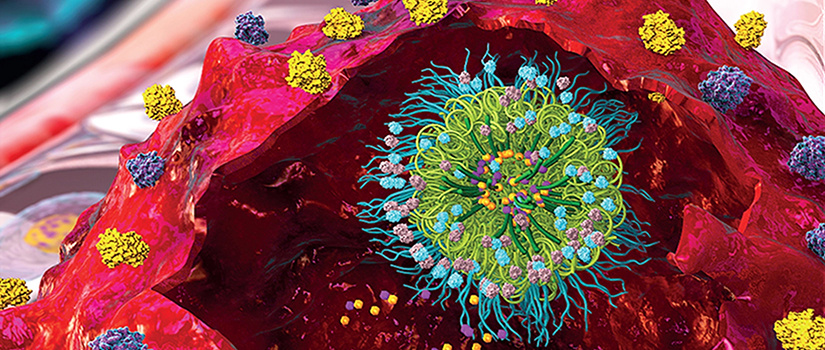Posted on: January 2, 2020
For cancer patients, it can be a difficult road as their oncologists try to balance providing a treatment to fight the disease while keeping the drugs at safe levels. One researcher at the University of South Carolina College of Pharmacy may be on the path to solve the dilemma of safety versus efficacy in cancer therapy.
Peisheng Xu, Ph.D. and his team of researchers, recently completed a study that was featured as the cover story for Advanced Functional Materials, a peer reviewed scientific journal. The article outlines the development of a heterotargeted nanococktail with traceless linkers in an effort to eradicate cancer.
“Cancer cells are very smart,” Xu says, “and the nanococktail is a drug combination that provides a way to prevent the cancer cell from escaping. This new method of delivering the treatment drugs appears to provide both efficacy in killing the cancer cell while being safer for the patient to tolerate without the traditional side effects.”
Dr. Peisheng Xu’s highly sophisticated drug delivery system, that he developed, could represent a breakthrough in cancer treatment ...
Kim Creek, Ph.D. Associate Dean of Research
“Dr. Peisheng Xu’s highly sophisticated drug delivery system, that he developed, could represent a breakthrough in cancer treatment, where cocktails of extremely toxic drugs can be delivered only to the tumor, killing the cancer and sparing the patient from the toxic side effects normally associated with standard chemotherapy,” according to Kim Creek, associate dean of research and chair of the Department of Drug Discovery and Biomedical Sciences at the UofSC College of Pharmacy. “To emphasize and highlight the importance of this work the editors chose to showcase the studies on the front cover of the scientific journal reporting Dr. Xu’s findings."
While this study focused on targeting ovarian cancer, Xu notes it could possibly be used for other cancers such as breast, pancreatic, colon and prostate cancer. “The next step would be more tests for safety and to increase the treatment time and whether there is any recurrence,” Xu says.
To learn more about this groundbreaking research being done at the UofSC College of Pharmacy, read the study published in Advanced Functional Materials.
